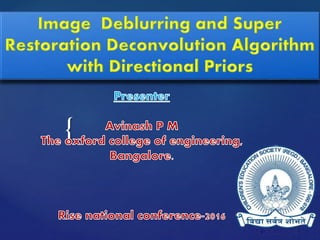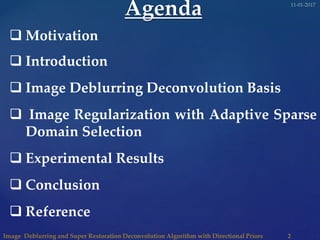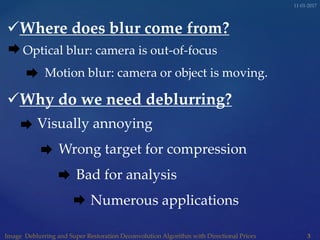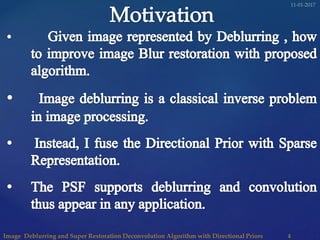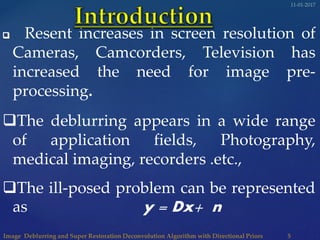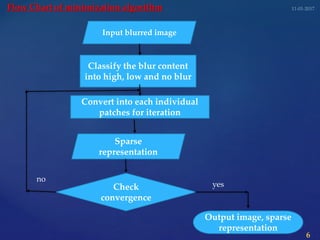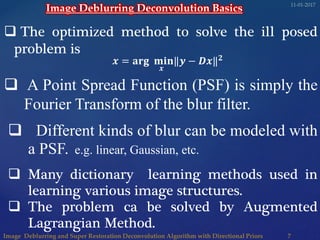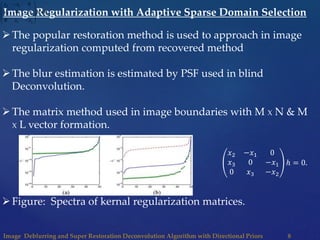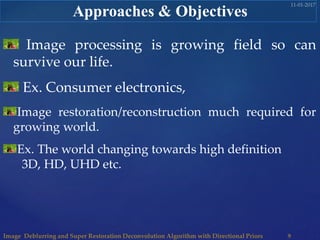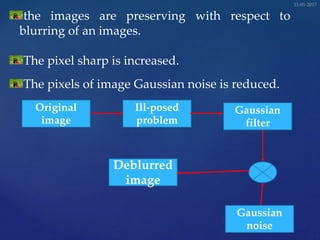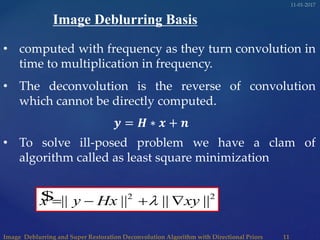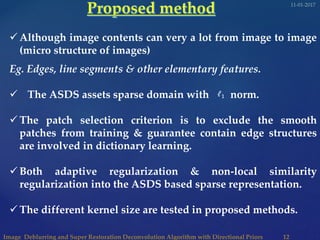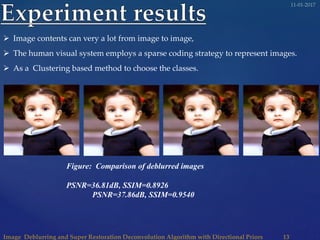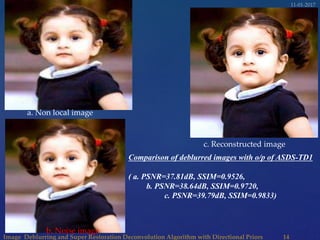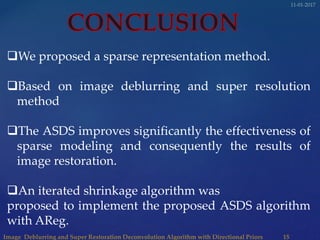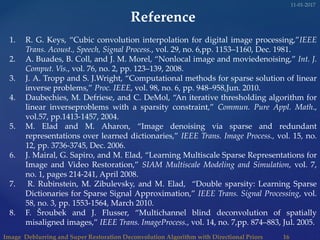PES ncetec conference
- 1. {
- 2. Agenda Motivation Introduction Image Deblurring Deconvolution Basis Image Regularization with Adaptive Sparse Domain Selection Experimental Results Conclusion Reference
- 3. Where does blur come from? Optical blur: camera is out-of-focus Motion blur: camera or object is moving. Why do we need deblurring? Visually annoying Wrong target for compression Bad for analysis Numerous applications
- 5. Resent increases in screen resolution of Cameras, Camcorders, Television has increased the need for image pre- processing. The deblurring appears in a wide range of application fields, Photography, medical imaging, recorders .etc., The ill-posed problem can be represented as y = Dx+ n
- 6. Input blurred image Classify the blur content into high, low and no blur Convert into each individual patches for iteration Sparse representation Check convergence Output image, sparse representation yes no Flow Chart of minimization algorithm 6
- 7. 𝒙 = 𝐚𝐫𝐠 𝐦𝐢𝐧 𝒙 ‖𝒚 − 𝑫𝒙‖ 𝟐 The optimized method to solve the ill posed problem is A Point Spread Function (PSF) is simply the Fourier Transform of the blur filter. Different kinds of blur can be modeled with a PSF. e.g. linear, Gaussian, etc. Many dictionary learning methods used in learning various image structures. The problem ca be solved by Augmented Lagrangian Method. Image Deblurring Deconvolution Basics
- 8. Image Regularization with Adaptive Sparse Domain Selection The popular restoration method is used to approach in image regularization computed from recovered method The blur estimation is estimated by PSF used in blind Deconvolution. The matrix method used in image boundaries with M X N & M X L vector formation. Figure: Spectra of kernal regularization matrices. 2 1 3 1 3 2 0 0 0. 0 x x x x h x x 𝑥2 −𝑥1 0 𝑥3 0 −𝑥1 0 𝑥3 −𝑥2 ℎ = 0.
- 9. Approaches & Objectives Image processing is growing field so can survive our life. Ex. Consumer electronics, Image restoration/reconstruction much required for growing world. Ex. The world changing towards high definition 3D, HD, UHD etc.
- 10. the images are preserving with respect to blurring of an images. The pixel sharp is increased. The pixels of image Gaussian noise is reduced. Original image Gaussian noise Ill-posed problem Gaussian filter Deblurred image
- 11. $ 2 2 || || || ||x y Hx xy Image Deblurring Basis • computed with frequency as they turn convolution in time to multiplication in frequency. • The deconvolution is the reverse of convolution which cannot be directly computed. • To solve ill-posed problem we have a clam of algorithm called as least square minimization 𝒚 = 𝑯 ∗ 𝒙 + 𝒏
- 12. Although image contents can very a lot from image to image (micro structure of images) Eg. Edges, line segments & other elementary features. The ASDS assets sparse domain with norm. The patch selection criterion is to exclude the smooth patches from training & guarantee contain edge structures are involved in dictionary learning. Both adaptive regularization & non-local similarity regularization into the ASDS based sparse representation. The different kernel size are tested in proposed methods. 𝓁1
- 13. Image contents can very a lot from image to image, The human visual system employs a sparse coding strategy to represent images. As a Clustering based method to choose the classes. Figure: Comparison of deblurred images PSNR=36.81dB, SSIM=0.8926 PSNR=37.86dB, SSIM=0.9540
- 14. Comparison of deblurred images with o/p of ASDS-TD1 ( a. PSNR=37.81dB, SSIM=0.9526, b. PSNR=38.64dB, SSIM=0.9720, c. PSNR=39.79dB, SSIM=0.9833) a. Non local image c. Reconstructed image b. Noise image
- 15. We proposed a sparse representation method. Based on image deblurring and super resolution method The ASDS improves significantly the effectiveness of sparse modeling and consequently the results of image restoration. An iterated shrinkage algorithm was proposed to implement the proposed ASDS algorithm with AReg.
- 16. Reference 1. R. G. Keys, “Cubic convolution interpolation for digital image processing,”IEEE Trans. Acoust., Speech, Signal Process., vol. 29, no. 6,pp. 1153–1160, Dec. 1981. 2. A. Buades, B. Coll, and J. M. Morel, “Nonlocal image and moviedenoising,” Int. J. Comput. Vis., vol. 76, no. 2, pp. 123–139, 2008. 3. J. A. Tropp and S. J.Wright, “Computational methods for sparse solution of linear inverse problems,” Proc. IEEE, vol. 98, no. 6, pp. 948–958,Jun. 2010. 4. Daubechies, M. Defriese, and C. DeMol, “An iterative thresholding algorithm for linear inverseproblems with a sparsity constraint,” Commun. Pure Appl. Math., vol.57, pp.1413-1457, 2004. 5. M. Elad and M. Aharon, “Image denoising via sparse and redundant representations over learned dictionaries,” IEEE Trans. Image Process., vol. 15, no. 12, pp. 3736-3745, Dec. 2006. 6. J. Mairal, G. Sapiro, and M. Elad, “Learning Multiscale Sparse Representations for Image and Video Restoration,” SIAM Multiscale Modeling and Simulation, vol. 7, no. 1, pages 214-241, April 2008. 7. R. Rubinstein, M. Zibulevsky, and M. Elad, “Double sparsity: Learning Sparse Dictionaries for Sparse Signal Approximation,” IEEE Trans. Signal Processing, vol. 58, no. 3, pp. 1553-1564, March 2010. 8. F. Šroubek and J. Flusser, “Multichannel blind deconvolution of spatially misaligned images,” IEEE Trans. ImageProcess., vol. 14, no. 7,pp. 874–883, Jul. 2005.
